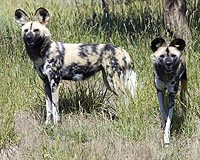| . |  |
. |
Kuala Lumpur (AFP) May 27, 2009 Wildlife activists have built a treetop bridge in an orangutan sanctuary on Borneo island to help the endangered apes find new mates and prevent inbreeding, a report said Wednesday. The 43-metre suspension bridge was completed last month at the Lower Kinabatangan Sanctuary in the eastern Malaysian state of Sabah, the New Straits Times reported. "But this is a temporary measure. In the long run, we must create forest corridors for orangutans and other animals to move about," said Nobuo Nakanishi from the Borneo Conservation Trust Japan, which helped fund the project. Orangutan habitats in Malaysia and Indonesia have been decimated as their jungle habitats are cleared by logging and to make way for plantations, putting them at risk of inbreeding as they are split into smaller populations. The 26,000-hectare (64,250 acre) Lower Kinabatangan sanctuary is divided into 10 lots among oil palm plantations and villages. Experts say there are about 50,000 to 60,000 orangutans left in the wild, 80 percent of them in Indonesia and the rest in Malaysian's eastern states of Sabah and Sarawak on Borneo island. A 2007 assessment by the United Nations Environment Program warned that orangutans will be virtually eliminated in the wild within two decades if current deforestation trends continue. Share This Article With Planet Earth
Related Links Darwin Today At TerraDaily.com
 Carnivores Can Be AntiSocial And Successful
Carnivores Can Be AntiSocial And SuccessfulWashington DC (SPX) May 27, 2009 Packs of hunting dogs, troops of baboons, herds of antelope: when people observe social animals, they are often struck by how intelligent they seem, and recent studies suggest that sociality has played a key role in the evolution of larger brain size among several orders of mammals. But new research from two evolutionary biologists, John Finarelli of the University of Michigan and John ... read more |
|
| The content herein, unless otherwise known to be public domain, are Copyright 1995-2009 - SpaceDaily. AFP and UPI Wire Stories are copyright Agence France-Presse and United Press International. ESA Portal Reports are copyright European Space Agency. All NASA sourced material is public domain. Additional copyrights may apply in whole or part to other bona fide parties. Advertising does not imply endorsement,agreement or approval of any opinions, statements or information provided by SpaceDaily on any Web page published or hosted by SpaceDaily. Privacy Statement |